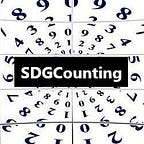Leaving No One Behind in Data for Covid-19 and the 2030 Agenda
SDGCounting UN World Data Forum Session Notes
This post is part of a series highlighting sessions from the 2020 UN Data Forum. Watch every session or read our summary.
Summary: During the pandemic, data has been at the center of policy making and public attention. It is pressing that policy makers, development partners and citizens understand the impact of COVID-19 on subsections of the population in terms of public health, the labor market, mobility, inequality and poverty. This impact, and the production and communication of disaggregated data, is crucial to ensuring no one is left behind — in the pandemic and the Global Agenda.
Speakers
- Al Kags, Co-founder and CEO, The Open Institute
- Ana Lucia Arellano, International Disability Alliance
- Bard Vegar Solhjell, Norwegian Agency for Development Cooperation,
- Edward Ndopu, UN Secretary-General’s Advocate for the SDGs UN
- Keith Mitchell, Prime Minister, Grenada
- Marjo Bruun, Director General, Statistics Finland
- Raj Kumar, Devex
Key Takeaways
- Good data and reliable statistics are at the heart of almost all informed decisions — both for the developed and developing worlds.
- Globally, 2/3 of annual deaths are not registered (according to WHO). Imagine what effect this has on numbers and decision making during COVID-19.
- We need both aggregated and disaggregated data.
- Statistics are fundamental to leaving no one behind, and the pandemic has made even clearer the importance of data.
Keith Mitchell, Prime Minister, Grenada
- This is the busiest year for statistics in Grenada.
- The Census is the only source of data that covers certain characteristics of population data and SDG relevant data.
Marjo Bruun, Director General, Statistics Finland
- We need to work together and look outside of NSOs for data sources; humans generate data every minute of every day.
Bard Vegar Solhjell, Norwegian Agency for Development Cooperation
- There is a chance that private companies know more about people than NSOs do, and there are opportunities to work with the private sector that we haven’t explored yet.
- Mobile phones are a very good source of data; they give a big advantage to showing what is happening in society.
- The most vulnerable can be left out of the data collected in smartphones, but more and more places now have impressive mobile and internet coverage.
Raj Kumar, Devex
- Premise is a Silicon Valley company using local citizen data to fill data gaps. Through a public network of thousands of local citizens in Sub-Saharan Africa and beyond, it pays local respondents to collect data by taking photos, capturing insights (like the price of tomatoes in a given area, etc.)
Al Kags, Co-founder and CEO, The Open Institute
- The COVID-19 pandemic has shown us that governments can use data (like contact tracing) in really intrusive ways, and are doing that.
Edward Ndopu, UN Secretary-General’s Advocate for the SDGs UN
- The same groups time after time are more affected by crises (COVID-19, racial injustice, climate change, etc.)
- It is imperative we are able to disaggregate data on the lines of gender, race, disability and geography.
- This data is important so we really understand who we are talking about when we say leave no one behind.
Ana Lucia Arellano, International Disability Alliance
- The roadmap out of the pandemic is the 2030 Agenda; we all know this; we need to act on it.
- People with disabilities face myriad barriers as a result of the pandemic and are not being considered in COVID legislation; they will be left further behind.
- Top barriers for persons with disabilities include a lack of access to information, social and employment protection measures and lack of official COVID-19 data on persons with disabilities.
- Civil society can fill data gaps, and disaggregated data are needed. Out of 93 country survey respondents, none are currently disaggregating data for people with disabilities.
- Citizenry data needs to be recognized and used by governments, persons with disabilities and their families that have been disproportionately affected.
bp
